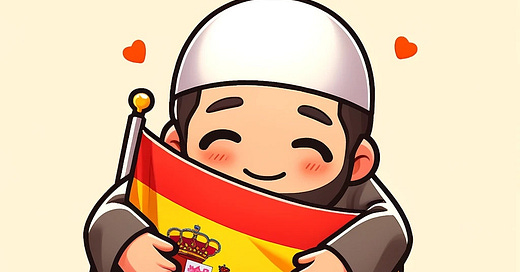Spain completes a cycle in its relationship with Muslims
Recognizing Palestine is a sharp contrast to the dark days of the Spanish Inquisition
At the end of May 2024, Spain announced plans to recognize a Palestinian state. The Iberian state’s historical relationship with Islam has ebbed and flowed sharply over the course of the last 1,400 years, with the latest decision marking a positive step. It comes a time when Muslims in many other countries feel powerless in their efforts to support Palestine.
Muslims arrived in the Iberian Peninsula in the early 8th century. An Umayyad army led by the Berber general, Tariq bin Ziyad, made rapid inroads, defeating the incumbent Visigoths, and by 718, a majority of the Peninsula was under Muslim control. The area acquired the name Al-Andalus, and became part of the Umayyad Empire. Subsequently, in 756, the independent Emirate of Cordoba was established by Abdulrahman I, who was fleeing Abbasid assassins after the Abbasid dynasty had seized control of the Islamic Caliphate.
Muslim Spain featured significant scientific, cultural, and architectural advances, exemplified by the intellectual contributions of the Muslim polymath, Ibn Rushd, known as Averroes in Latin circles. Andalusia paved the way for the European Renaissance, by being the conduit through which the scientific discoveries of capitals such as Baghdad, Cairo, and Damascus were transmitted into the non-Islamic parts of the continent. Today, tourists can be reminded of the positive role that Islam and Muslims played in European history by viewing the magnificent Al-Hambra Palace in Granada.
However, shortly following the arrival of Muslims, a process of reconquest of the Iberian Peninsula by Christians commenced. This protracted military operation lasted seven centuries, culminating in the fall of Granada in 1492, coincidentally (and ominously) the same year that Christopher Columbus set sail for the New World. Once the reconquest was complete, the Christian rulers launched a systematic wave of forced conversions, expulsions, and executions targeting Muslims and Jews, with the ultimate goal of Chritianizing the entirety of Spain.
By the early 17th century, this process was complete, making Spain the only land where Islam arrived and left completely. In all other areas of Africa, Europe, the Middle East, and Asia, wherever Muslims arrived, pockets of their descendants persist to this day, practicing the religion. But in Spain, the morbid efforts of the Spanish Inquisition led to a terminal elimination of Islam from its territories.
For this reason, Muslims naturally feel a sense of unease and sadness when considering the history of Spain’s relationship with their religion. Personally, when I read about how suspected Muslims were forced to keep their doors open on Fridays to prevent secret juma gatherings, and about the last defiant attempts to keep the call to prayer audible, I was on the verge of tears thinking how torturous an existence it must have been for my Iberian brothers and sisters five centuries ago.
The 9/11 attacks contributed to a profound crisis for the Islamic world, with many non-Muslims acquiring a sense of deep suspicion toward Muslims that harked back to the Spanish Inquisition’s brutal ideology. The 2004 Madrid Train bombings – conducted by Al-Qaeda – led to a further deterioration in the relationship between Spain and Muslims, as almost 200 innocent people died, and nearly 2,000 were injured.
Yet, in geopolitics, 20 years is a lifetime, and there is no better illustration than the Spanish government’s recent decision to recognize Palestine as a state, joining a small but growing list of Western industrialized countries that have taken this step. Notably, the justification offered by the Spanish government is certainly secular: humanitarian concerns, a belief that the step contributes to peace and stability in the Middle East, and a desire to maintain good relations with the Arab states that share the Mediterranean Sea with Spain are all factors that contributed to the decision. As would be expected for a country that separates religion from state, an affinity for Muslims did not play a role. Nevertheless, there is little doubt that Muslims across the world rejoiced at the decision, and that Spain anticipated this positive response when it mulled the decision over.
Another notable feature of Spain’s recognition of Palestine is the broad-ranging nature of support for the decision. Upon its announcement in Parliament, the decision drew a standing ovation covering a wide range of political parties, and the government also highlighted the strong grassroots support that contributed to the ruling. In other words, this was not a transient, tactical move by a cabal of foreign policy string-pullers; instead, it a reflected a pan-societal belief that this both served Spanish interests and was the right thing to do.
Though Muslims across the world are aware that Spain’s decision was unrelated to the specific religious beliefs of Palestinians, their appreciation of the step was enhanced by their own sense of frustration with what they perceive to be the inadequate pressure exerted by their Muslim governments. While all Muslim countries have recognized Palestine since its inception, there is a growing sense among ordinary Muslims that this is little more than a token gesture, and that the Islamic world – including Palestine – continues to be at the mercy of the great Christian and secular powers of the world. In this context, they see Spain’s decision as a bold one, reflecting a willingness to challenge the international status quo that they yearn to see in their own countries.
For those who have been using Facebook since the platform’s launch in the early 2000s, under the profile for Spain, it would describe its relationship with Islam as “it’s complicated”. There have been highs, such as Andalusia’s intellectual preeminence during the Middle Ages; and there have been lows, such as the Spanish Inquisition running rampant. The decision to recognize Palestine is the latest link in this tempestuous chain of interactions, and serves as a timely reminder of how nothing is forever, especially in geopolitics.




